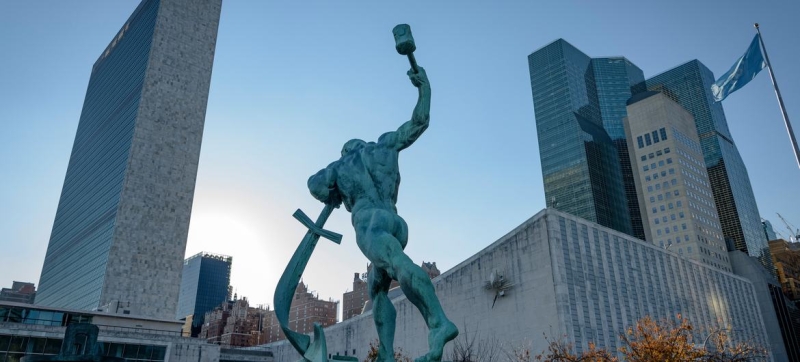
View of the UN Headquarters in New York Future Summit: Key Themes UN
The Future Summit could not have a more strategic goal: organizers want to map out a practical plan to ensure a better future for people and the planet. To make the task more feasible, participants are being asked to focus on five key themes that will be discussed over the four days of the historic gathering at the UN.
Late September is a pivotal time for the United Nations, as world leaders descend on New York for high-level debates at the General Assembly. Taking advantage of the opportunity, UN chief António Guterres has invited high-level guests, including civil society activists, to attend this year’s Future Summit.
The forum will feature panel discussions and numerous events, divided into five main themes, along with so-called “cross-cutting” themes such as human rights, the climate crisis and gender equality, which are linked in one way or another to all of the Summit’s key issues.
Financing for Development
“The international financial architecture created in 1945 after the Second World War is being subjected to a stress test of historic proportions – and it is failing,” says UN Secretary-General António Guterres.
The issue of reforming the financial system has become even more pressing as the deadline approaches for implementing the 2030 Agenda for Sustainable Development, the UN’s blueprint for a better future.
Read also:
EXPLAINED | Five things you need to know about the Future Summit
The Summit’s main outcome document, known as the Pact for the Future, is, in Guterres’ words, a commitment by countries to “use all the tools at our disposal at the global level to address challenges before they overwhelm us” and to commit to taking “bold steps” to implement the Agenda, with a particular focus on eradicating hunger and poverty, reducing inequalities and taking action to combat climate change.
International Peace and Security
The UN warns: the world is in an extremely dangerous situation that could lead to major powers will be drawn into the biggest conflict since the end of the Cold War, with experts saying the odds of nuclear war are higher than at any time in decades, and the climate crisis is driving migration and exacerbating tensions.
There are also new threats associated with technological developments. In 2023, the New Agenda for Peace was published, the first global peace plan prepared by the UN in decades, outlining a range of solutions from peacekeeping and peacebuilding to disarmament and Security Council reform.
The recommendations set out in the New Agenda form the basis of the Pact for the Future to be adopted at the Future Summit.
Science, Technology and Digital Cooperation
UN Member States will also adopt the Global Digital Compact, which aims to build trust in the Internet, give people more options for using data, and outline the parameters of liability for content that misleads or discriminates against users.
The treaty contains warnings about the consequences of the malicious use of AI to deepen divisions within and between countries, increase user insecurity, violate human rights, and exacerbate inequality.
The document sets out a list of commitments and actions, and also mentions the “digital divide”: 2.6 billion people do not have access to the Internet, which deprives them of the opportunities offered by online tools. The treaty calls for all schools and hospitals to be connected to the internet through the UN-backed Giga initiative, and for the population to be taught digital literacy skills.
It plans to establish an International AI Science Group and hold an Annual Global Dialogue on AI Governance, and by 2030, develop global standards that benefit everyone.
Youth and Future Generations
The third document to be adopted at the Summit will be the Declaration on Future Generations. Along with commitments to end inequality, ensure quality education for all and ensure long-term planning, the Declaration proposes the establishment of a UN Special Envoy for Future Generations, tasked with advocating across the UN system for more effective long-term thinking and disseminating information from the UN Futures Lab, the organization’s research arm.
On Friday, September 20, the first day of the summit, the famous General Assembly Hall will host a youth Day of Action featuring activists and celebrities. On Monday, September 23, the Trusteeship Council Chamber will host an interactive dialogue on how to improve the global system for present and future generations.
Global Governance
When the United Nations was founded nearly 80 years ago, the world was emerging from a shattered global conflict so devastating that world leaders readily agreed to create institutions to ensure that nothing like it would ever happen again.
While the architecture agreed upon remains relevant, many around the world agree that these instruments need serious revision to remain effective. The summit will provide world leaders with an opportunity to discuss the changes needed and to compare notes on the most contentious of these issues: reform of the UN Security Council.
Space issues will be a particular focus. In recent years, there have been calls for stronger governance structures in this area as private sector use of space expands rapidly and new countries join the ranks of spacefaring nations.
Major intergovernmental initiatives are underway to establish a long-term human presence on the Moon, programs are underway to advance human spaceflight to Mars, and various concepts for resource extraction from the Moon and the asteroid belt are being explored. However, new forms of governance are needed to ensure that rapid developments in this area occur in a secure environment.
